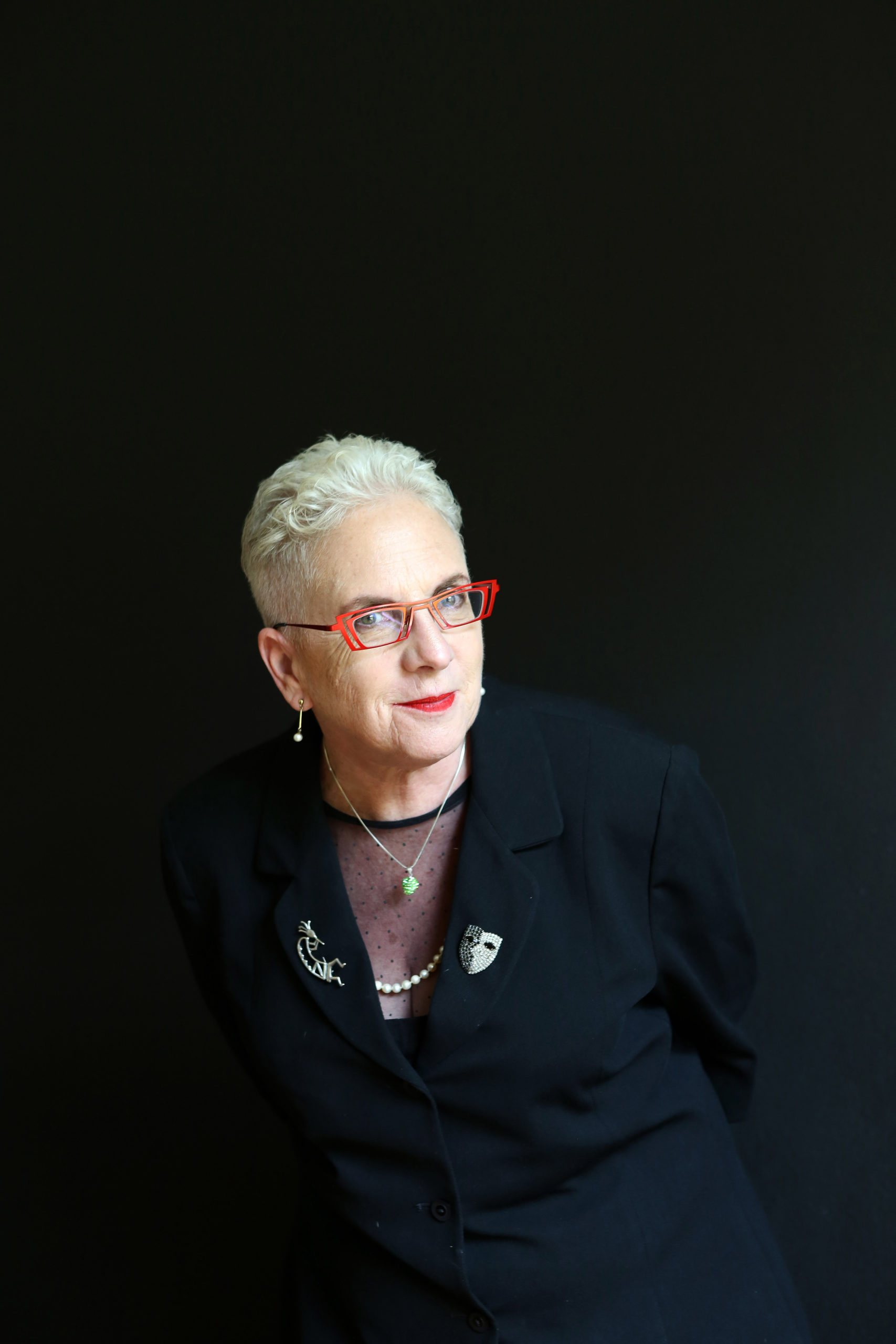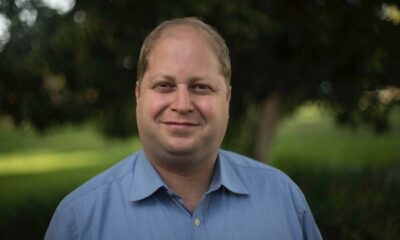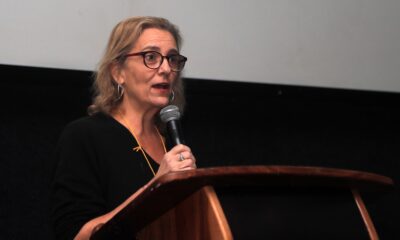
OpEds

Confessions of a prodigal daughter: my first Limmud
I’ve always felt a bit like a prodigal daughter. I discovered late that I was 16 ways Lithuanian – a born Litvak. Accused of “killing our Lord” in Aberdeen at seven. Prepared for my Joburg Batmitzvah from scratch from London.
Returned to South Africa in my early teens to be initiated into the United Progressive Jewish Congregation, where my grandfather was a big macha. Joined the Reform youth movement, Maginim, where I lost my virginity and learned the tricks of the Zionist trade.
And then, at 20, married a boychik who leaned heavily towards Orthodoxy. The first time I was told to “go upstairs” to the women’s section, I broke down in tears. Seven years later, after having been cajoled out of the marriage by unfulfilled dreams – it just wouldn’t stick – I departed South Africa and bungee-jumped my way into the real world.
Two years later, I returned just before Madiba was released. I thought he’d done it for me personally. I committed to the country as if I’d been born here. Wed my second husband, a non-Jew, and settled down forever, outside the Pale. Now, it’s time.
Nobody ever told me about Limmud. Perhaps I didn’t look the type. Perhaps I’d strayed too far from my tribal roots. I sometimes lit Shabbat candles for my dead grandparents, or the doggies, but that was about it. And yet. And yet. When I returned to academic study after a 30-year gap, I chose to pen a novel on the very subject of the wandering Jew – that antisemitic myth created by monks in the Middle Ages, rear engineered back to the Bible and dressed, in different garb, to this very day.
I identified with this character: the forever outsider. The immortal wanderer. The eternal scapegoat. But what if the wandering Jew … was a woman? From this premise, my imagination took flight, and I wrote The Gospel According to Wanda B. Lazarus by turning the myth on its head. This was the subject of my talk at Limmud Johannesburg and Cape Town.
I first heard about Limmud as an accidental dinner guest in Cape Town. I’d gone to a launch at the Gitlin Library – Jonathan Ancer’s Mensches in the Trenches – and was thrilled at the level of intellectual curiosity the audience had for this seminal work. Afterwards, I sought a dinner spot, and was invited to join a table containing seasoned Limmudniks – they don’t wear it on their sleeves. When Janet K told me of this organisation, welcoming, nay encouraging, divergent Jewish points of view, I was intrigued. “So, we don’t have to cover our elbows and our knees? We don’t have to go behind the veil? We can step out of being barefoot, pregnant, and in the kitchen?” “Nonsense,” Janet said. “Our presence and our opinions are as valued as any other Jew.” And this is the very premise of Limmud. Democratisation. No titles. Acceptance of interrogation where no women has gone before. Women training to be Orthodox rabbis. Same-sex parents. Reform, even.
“Why don’t you apply,” Janet asked, “to do a talk on your novel, exploring this theme of antisemitism? It’s a hot topic in the gola right now. I’ll put you in touch.” And so she did. And so I did. And presented in both Johannesburg and Cape Town in what I call my “virgin trip out” to become a Limmudnik.
And this is what I found: a celebration of Jewish community, learning, and culture, a spirit of enquiry and curiosity, talks, plays, singalongs, shiurim. Schmoozing with the locals. Reconnecting with ancient school friends. Making friends with babies. And discovering a cross-section of global minds who all step up to being Jews in the modern world.
Limmud works with volunteers at every tier of preparation. Nobody gets paid. All the moola collected goes to having the best conference ever, with speakers from all over the world. I volunteered straight up – it’s a great way to get to know people – and my first task was to fetch the Gorfinkels from Orchards to schlep them to the venue. I got 10 very exclusive minutes with the famed Jordan B, the editor of DC Comics’ many superheroes, interpreting and applying Jewish values to everything he touches.
I understand there’s a faribel with certain Orthodox rabbis. I don’t want to go into that. They’ve banned themselves, it seems. And in spite of this, a shomrei Shabbat vibe is entered into, especially in Johannesburg, where we were residential.
We could do what we liked in the privacy of our rooms, we were told. But in the communal space, bevakashah, respect the Sabbath. Enjoy the delicious kosher fare. Don’t take pics. Stay off social media. Don’t put the urn on.
I must admit, it was a challenge to present with no visual aids whatsoever, but I learned a few things, and when I presented in Cape Town the following Sunday, I was more comfortable with a PowerPoint presentation, using visuals to illuminate my points of reference.
Sue – my blind-date roommate – and I strolled to the swimming pool, where I’d promised myself I’d take a dip. There, in the shallows, stood a buxom blonde, dress rolled up, and a hunky Hungarian with a stolen towel. It was Hannah Gaventa, non-government-organisation specialist extraordinaire, and Tomi Büchler, her wingman for the South African leg. They dared me into the water, so what could I do? I dove in in my t-shirt and almost vrekked from the shock. What a way to meet those who are likely to become lifelong friends.
The programme was choc-a-bloc with fascination. Hard to choose, but I did a bit of homework before I landed, and saw my favourite internationals in Johannesburg – Yair Rosenberg, who summarised the antisemitism I needed to know about; Jordan B, whose every lecture I attended. The dulcet tones of Maria Camerini; and cultural insights from Emmanuelle Stein, whose voices were touching and Talmudic. Anat Hoffman, tireless activist for the Reform movement in Israel. I wept through Clinton Fein and Bryan Schimmel’s brave and crazy two-hander on bullying. Loved Gil Hovav’s mesmerising memoirs; Rachael Pass’s deep dive into Asherah; and Adina Roth’s feminist interpretation of Talmudic texts. I even attended the silent disco, and danced into the early hours with a gaggle of young Limmudniks.
And the food – you know, you must feed Jews. And did we eat! Johannesburg and Cape Town’s gala dinners were a true feast, we were kept fed and watered between sessions, and the gehakte herring flowed.
In short, through Limmud 2022 , I found my people. I’ll volunteer for 2023. I’m hooked on the tribe once more. I couldn’t be happier. And I never have to go to the back of the shul again.
- Lynn Joffe is chief executive of Creatrix, a multicultural storytelling agency, and the author of the novel, The Gospel According to Wanda B. Lazarus.











Brett Steingo
September 1, 2022 at 9:03 am
Beautiful Lynn, thank you. Good to have you back. I’ve been to Limmud every year since its inception in SA 15 years ago and while I enjoy the communities I have been part of and find the the chaggim meaningful, Limmud is the one “chag” I will not miss. It feels apt to say ‘Chag Limmud Sameach’ when it comes around. Having spent the last 2 years in Mauritius I’ve missed most of the Jewish functions and chaggim lately, but I flew back for Limmud and it was wonderful. Hope to see you next year. I think for a growing number of people, Limmud epitomises their connection to the Jewish community.
Layne Cain
September 2, 2022 at 8:08 pm
Outstanding. You made me want to move back to Jozi. Almost. Proud to bursting point to have you in my life. Endlessly.
Rachel Christou
August 17, 2023 at 8:06 pm
So proud to have met you in person Lynn,such a talented & vivacious chik, & seeing Layne mou’s comment here…well. Love, love, love